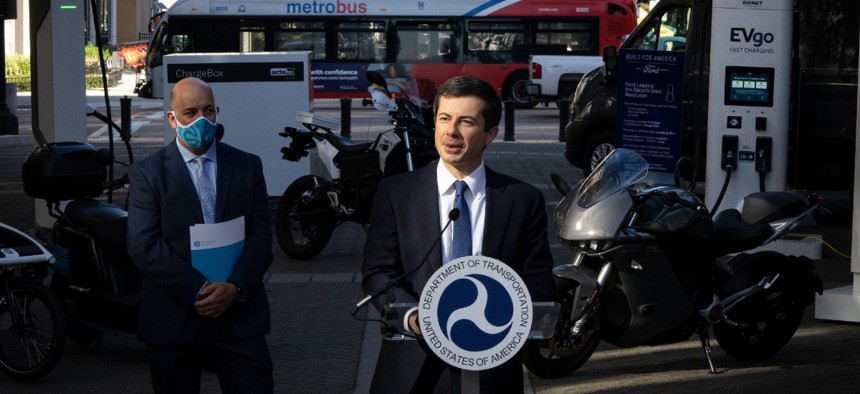Transportation Secretary Pushes for Government Support for Vehicle Innovation

Transportation Secretary Pete Buttigieg speaks during an electric vehicles event outside of the agency’s Washington headquarters in October. Getty Images/Drew Angerer
Pete Buttigieg doubled down on the government's role in fostering a strong environment for emerging tech like electric cars and buses and automated vehicles.
Speaking remotely on the second day of the annual Consumer Electronics Show, Transportation Secretary Pete Buttigieg discussed the agency’s commitment to fostering technological growth for U.S. travelers.
Between establishing oversight for autonomous vehicle operations to researching smarter pavement material, Buttigieg reaffirmed the department’s mission to support advanced technology.
“Transportation and technology have always gone together,” he said Thursday.
The former mayor specifically outlined several principles Transportation is adopting to help make American transportation systems compatible with new technology. These include supporting innovation on a policy level, helping communities adapt to new technology, supporting workers, creating an environment that fosters experimentation, and encouraging collaborations between the public and private sectors.
Buttigieg dispelled the notion that government bodies cannot support advances in public technology, mentioning the historical examples of government's investment in the inputs of some of the most popular and prominent modern technologies, such as lithium batteries for iPhones.
“Government invests in pursuit of a different kind of return than what the private sector seeks; not the direct financial return on investment, but the benefits to the American people,” he said.
Since Buttigieg took the helm of the Transportation Department following Biden’s election victory, he has championed innovation in industries like electric and automated vehicles. His comments at CES reiterate a commitment to helping shift policy toward supporting greener and modernized transportation solutions.
Back in December, his agency collaborated with the U.S. Department of Energy to create the first Electric Vehicle Office to oversee the research and development of the electric vehicle market in America, in pursuit of the goal of establishing a network of about 500,000 electric vehicle charging stations.

NEXT STORY: Low- and No-Code Software Increasingly Popular Among State CIOs






